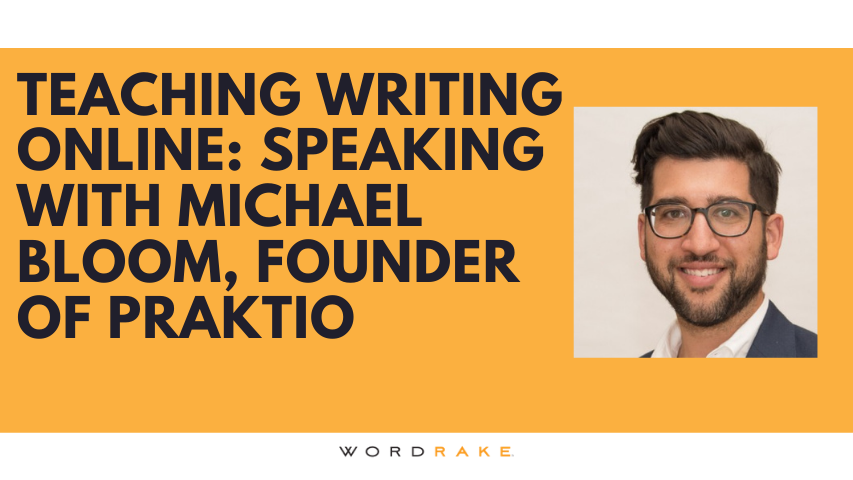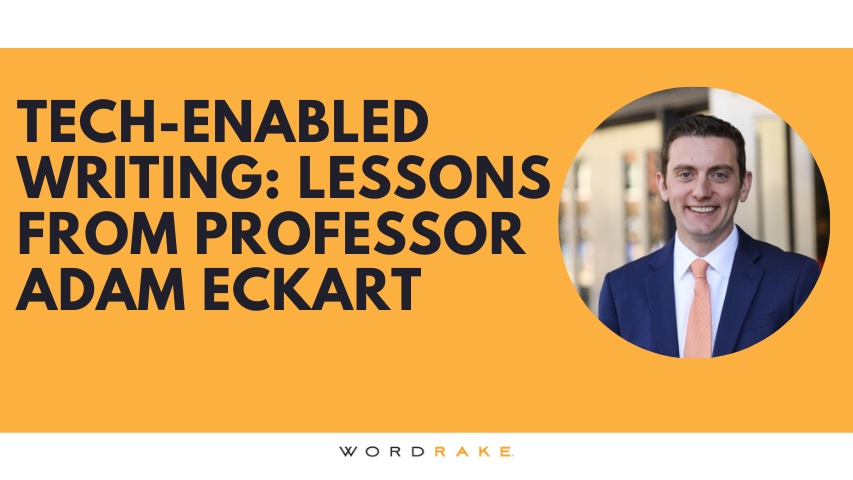When a law student graduates from law school, they quickly realize there is more to learn than what law school taught them. WordRake recently spoke with Michael Bloom, founder of Praktio, an online learning platform for lawyers. Michael is a former lawyer and law school professor turned tech entrepreneur.
1. What got you interested in creating educational content for lawyers?
I originally created Praktio to help my Michigan Law students navigate a language barrier obstructing their ability to stretch into client work in my transactional clinic. Most of the work in the clinic involved reviewing and drafting contracts, and I wanted to speed up their development of these skills with online, interactive, self-paced training on the model of language learning apps. So I built this training with whatever e-learning authoring tools I could find. Once these materials evolved to prove useful for my students, I realized they could solve similar problems and be of similar benefit to junior and summer associates at firms.
2. How is good writing tied to being effective as a transactional attorney?
Good writing starts with understanding your audience and what you want to accomplish for them (i.e., what you want them to learn or do). For transactional attorneys, this includes considering who will be ingesting our various drafts (e.g., supervising attorneys, clients, counterparties, judges) throughout the phases of a relationship (e.g., negotiations, performance, good times, bad times, potential disputes, litigation). This lens helps the drafter anticipate concerns and choose their words carefully to drive desired responses by those various stakeholders throughout those potential phases. It becomes complex (and interesting!) once you think of contract drafting as a human-centered design enterprise with all these different stakeholders and interests. We also produce much more useful work product.
3. What do you say to lawyers who fear tech because they don’t want to seek “outside” help for their work?
The most effective lawyers learn how they can be useful as members of a team using their technical skills to help clients solve their problems and accomplish their goals. Once you adopt this model, it's no longer about showing how brilliant you are. It becomes about how to best accomplish the desired result for the client. If technology helps you to do that, you better adopt it. If engaging certain experts help you do that, engage them. If training on skills or topics helps you toward that aim, do it.
4. What is the biggest mistake you see lawyers make when communicating with clients?
Written work product has to be actionable—designed for our clients to take informed action (i.e., make a decision). This requires empathy. It isn't about building an elaborate mirror to reflect how brilliant the writer is. It's about building tools that allow our clients to solve their problems and accomplish their goals easily. So that's probably presenting the answer succinctly so it allows the client to take the next action.
5. What do you think law schools get right and wrong for teaching writing?
I hesitate to talk about law schools in general because there have been several innovations and initiatives at different schools to advance the goal of better preparing students to be effective lawyers. But: Any law school class that still bases an entire grade on a single exam at the end of the semester—where students perceive being rewarded for how much they can write in a short while—is doing the profession a disservice. There's been a movement to incorporate "formative assessment" in law school classes—these are opportunities to apply lessons, receive feedback, and apply lessons from that feedback to the next activity. This is how we actually learn.
In addition, we should reward students for producing useful writing, not voluminous writing. Otherwise, we're training students to become lawyers who write for their own decoration instead of for our clients' goals.
6. Do you think there is a difference between writing for litigation and for transactional purposes? Why or why not?
Certainly. And there are commonalities too. All good writing starts with audience and goals and works backwards from there. That's true of, say, contract drafting or brief writing. But the audience and goals of certain writing that features more prominently in transactional work (e.g., contract drafting) will be quite different from that of litigation work (e.g., brief writing). There's of course writing that all lawyers will engage in, like emails with clients, opposing counsel, or colleagues.
7. Should writing be taught differently to lawyers depending on if they wish to become litigators or corporate lawyers?
In law school? I'm skeptical of law student wishes as to what they'd like to become, especially early on with limited (if any) exposure to doing the work. All law students should be taught how to write effectively for any professional context or work product and specifically for the range of work product typical of both litigators and transactional lawyers.
8. What do you think of the push to make contracts more visual and less verbose?
I applaud the push and hope it attains some traction, along with widening the aperture of how contract drafters regard the tools available to achieve their communication goals. It's helpful to think about contracts as analogous to software—technical writing, with an internal logic and external power. With software, there's a user-facing interface optimized for achieving desired user behavior and understanding. We don't expect software users to pore over the code to interact with the software. And yet that's what we do with contracts. We use the same language for implementing the technical logic of the agreement and for providing a guide to the parties for their behavior. It's a fairly absurd combination of uses for the same language, and against the backdrop of that tension of goals, we see the push for and resistance to making contracts plainer, shorter, and more visual. I'd love to see some experimentation in bifurcating the contract to have a "user interface" and a "codebase."
About Michael Bloom:
Michael Bloom is the founder and CEO of Praktio (www.praktio.com), a provider of modern training—practical, interactive, self-paced, online—for reviewing and drafting contracts and other legal documents. Large law firms (e.g., Skadden, Pillsbury, Cooley) use Praktio to train their lawyers and staff, and large companies (e.g., GlaxoSmithKline) use Praktio to train their procurement departments. Previously, Michael was a clinical professor at Michigan Law and Chicago Law and practiced at Sidley Austin, with a focus in mergers and acquisitions and technology transactions.






